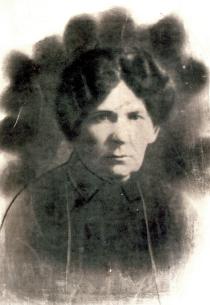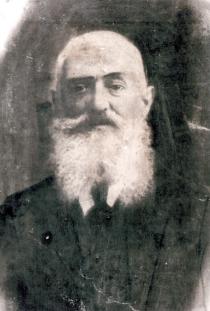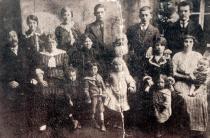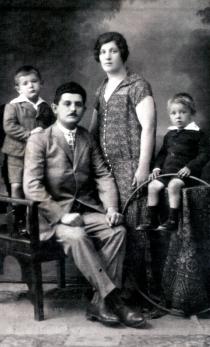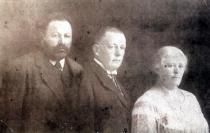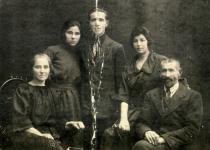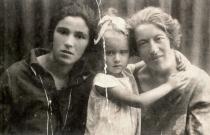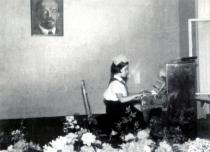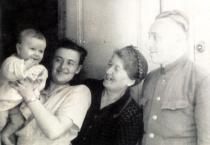
Faina Shlemovich
Chernovtsy
Ukraine
Interviewer: Ella Levitskaya
Date of interview: August 2002
The family of my father, Moisey Shlemovich, lived in Zhvantsy, Kamenets- Podolskiy district, Vinnitsa region. My grandfather, Boruch Shlemovich, was born in Zhvantsy in the 1870s. I know very little about his family. His father was a tailor and my grandfather was helping him from his childhood years on. When my grandfather mastered this profession and could provide for the family, he married my grandmother, Beila Shlemovich. She came from Zhvantsy and was two or three years younger than my grandfather. She came from a poor family with many children. She didn't have a dowry, but my grandfather didn't care. They had a Jewish wedding with a rabbi.
The majority of the population in Zhvantsy was Jewish. They lived in the center of town. Ukrainians lived in the outskirts. They were farmers and kept livestock there, and they supplied food products to the town. Jews were craftsmen and traders. They owned all the stores in Zhvantsy. There was a small market in town, but every family had their own suppliers, who brought their products directly to the houses. There was no anti-Semitism. People were friendly with each other. There was a synagogue and cheder in town. My grandfather's neighbor was a melamed in cheder.
I remember my grandparents' house. It wasn't very big, but it was a solid stone building. There was a shed and a small kitchen garden behind the house. In front of the house there was a flower garden with two or three fruit trees. There was an annex behind the house, which served as my grandfather's shop. There was an entrance door in the center of the house. The house was divided into two parts. There were three rooms and a kitchen on the left, and a small store on the right. They sold clothes made by my grandfather. He had two or three seamstresses working for him. He was rather wealthy. My grandfather worked, and my grandmother was a housewife.
My father's family was religious. There was a synagogue not far from the house, and my grandparents went there on Saturdays and on holidays. My grandfather also prayed at home. He had his tallit and tfilntefillin. They celebrated Sabbath and Jewish holidays. The boys had their bar mitzvah at 13, and the girls had their bat mitzvah at 12. They followed the kashrust in the family, and so they had separate dishes for dairy and meat products.
My grandparents wore casual clothes. My grandfather had a small beard. My grandmother didn't wear a wig or a shawl. She usually wore her hair in a knot and had a beautiful hairdo on holidays. She only wore a shawl when she went to the synagogue. She liked jewelry and often wore some.
There were no Jewish pogroms 1 in Zhvantsy. Perhaps, because it was a very small town and thus didn't arouse the interest of bandits. Besides, local Ukrainians got along well with Jews. The Revolution of 1917 2 didn't change life in town dramatically. There were no rich people there, and the authorities took no interest in its inhabitants. My grandfather lost his savings. He was saving for the time when he wouldn't be able to work anymore. I remember going to the attic of my grandparents' home when I was a child. I saw boxes full of fabric shreds, old letters, old toys and many other interesting things. Once I found a box full of bank notes. I believed that I had found a treasure and called everybody up there. My grandfather explained to me that it was old tsarist money, and that he kept it to remember his stupid naivety.
I remember heavy furniture in the rooms and dark curtains covering the windows. I also remember a big family photograph on the wall showing my grandmother, my grandfather and their children.
My father was born in Zhvantsy in 1899 and his brother, Iosif, followed in 1903. In 1906 my grandparents had a daughter, Shprintsia, and their last child, Sarah, was born in 1910.
Iosif married a local girl from a rich family in Zhvantsy. When collectivization 3 began, Iosif's wife and her parents were deported to Siberia. Iosif loved his wife and, although he didn't have to, he followed her. They settled down in Novosibirsk.
Sarah had a love marriage. Sarah and her husband, Gersh Shnaiderman, a Jew, had known each other from childhood. They fell in love and got married. Gersh was a shop assistant. Unfortunately their marriage wasn't happy later. Gersh took to drinking and caused Sarah much suffering. Their first daughter died in infancy; later they had twin daughters. Sarah and her husband moved to Kharkov before the war.
Shprintsia, her husband, Aron Baron, and their children were living in Dunayevtsy back then. Shprintsia's husband came to Sarah and her husband, and they helped him to get a job in Kharkov. When the war began Sarah asked Shprintsia and her children to come to Kharkov, but Shprintsia refused. Aron went to Dunayevtsy to pick them up. Shprintsia, Aron and their two sons perished in the ghetto in Dunayevtsy.
My father's family spoke Yiddish to each other. They spoke Ukrainian to Ukrainians, but there was a noticeable Jewish accent. Only my father and Iosif spoke fluent Russian. Shprintsia and Sarah's Russian was very poor.
My father and Iosif studied at cheder, and their sisters were educated at home. There was a Ukrainian elementary school in Zhvantsy. All the children finished it. My father read a lot and studied Russian. He successfully passed his exams for the Russian grammar school in Kamenets-Podolsk in 1908. He lived in the hostel and came home on vacations. My father was the only one of the family to finish grammar school. Iosif entered the same grammar school in 1912, but he didn't finish it due to the Revolution of 1917. My father's sisters only finished elementary school. In the early 1920s the authorities established a collective farm 4 in Zhvantsy. My father was well educated and was offered the position of the chairman of the village council, the head of the collective farm. He got this responsible post, although he was only in his early twenties then.
My mother's family lived in Mohilev-Podolsk. It was a fairly big town at that time. There were brick and stone buildings, stores, a theater and a restaurant. More than 50,000 people lived in the town. There was a big market. Vendors from all the surrounding villages were selling their food products and crops there. There were many Jews in Mohilev-Podolsk. Jews constituted approximately half of the population. Basically, the inhabitants of Mohilev-Podolsk were craftsmen and farmers. All tailors and shoemakers in Mohilev-Podolsk were Jews. Jews also kept small stores selling food products, clothing, shoes, and so on. They lived in peace with the Moldavians and Ukrainians. There were no nationality conflicts. There was also a Christian Orthodox church. People in Mohilev-Podolsk respected the traditions of each other.
My grandparents came from this town. My grandfather, Haim Gilberg, was born in the 1860s. I don't know my grandmother's maiden name. Her first name was Inda, and she was the same age as my grandfather. They died before I was born, and the little I know about them is from what my mother told me.
My grandparents were religious people. They wore traditional Jewish clothes. My grandfather wore a long black jacket and a black hat. My grandmother always wore long black gowns and a wig. I don't know what my grandfather did for a living. My grandmother was a housewife. They had six children: Sima was born in 1890, Israel in 1892, Velvl in 1894, Reizl in 1896, my mother, Hana, in 1898, and Ilia in 1900.
My grandparents celebrated Sabbath and Jewish holidays and went to the synagogue every week. The boys studied at cheder and the girls were educated at home. They spoke Yiddish in the family, but all children also spoke fluent Russian. Mohilev-Podolsk was a pretty big town, and my mother and her sisters and brothers socialized with many young people. Of all my mother's sisters and brothers only her older sister, Sima, grew up to be religious.
My mother came from a poorer family than my father, but her family paid attention to giving education to their children. All the children finished secondary school. Sima and Israel studied at the Jewish school for eight years, and the other children studied at the Russian school. After school Israel finished medical college and became a nurse. Nurses didn't have the right to operate at that time, but they were qualified to prescribe treatment., etc. Velvl finished financial college and became an accountant. Ilia, the youngest, finished the same college. The daughters didn't continue their studies after school. My grandfather believed that women had to learn to do housekeeping and get married.
My mother told me how she met my father. In the early 1920s he came to Mohilev-Podolsk on business. He met my mother's sister Reizl, who was a very beautiful girl. My father fell in love with her, but she was engaged to a Romanian Jew from Bucharest, who owned several stores. I don't remember his name. My grandfather didn't want his daughter to break off her engagement and marry a poor man from a small village. He expedited his daughter's wedding. It took place in Mohilev-Podolsk, and on the following day Reizl and her husband left for Romania.
Mohilev-Podolsk was on the right bank of the Dnestr River. The newly-weds had to cross the river. They were to cross it on a boat. There was another boat crossing the river. A man and his wife, older people, were on board. In the middle of the river they decided to change places, lost their balance and fell into the river. My mother's sister Reizl swam well. She grabbed both old people and managed to reach the bank with them. My mother said that those were scaring moments when she was watching her sister from the bank helplessly. The brothers ran to get another boat, but it all took time. They were all so happy to see Reizl and the survivors safe on the river bank.
My future father was also there when this incident happened. He was comforting my mother. When it was all over they threw themselves into one another's arms. Afterwards they started seeing each other. After some time my father asked my grandparents to allow him to marry their daughter. In less than a week my parents had a civil ceremony in Mohilev-Podolsk. My mother's parents insisted that they had a traditional Jewish wedding, but my father was a Soviet official and couldn't have a religious wedding. My father had given up his religious views, and my mother was under the influence of his revolutionary ideas and became an atheist, too. My grandmother made dinner and the newly-weds left for Zhvantsy.
Reizl and her husband lived in Bucharest. Her husband owned a few shoe stores. His business was successful. The man rescued by Reizl turned out to be a popular jeweler in Bucharest. He had a beautiful set with emeralds made in his shop and gave it to Reizl as a gift. Reizl and her husband had two sons. The family was doing very well. Once Reizl injured her leg. It didn't heal. Her brother Israel went to see her. He told her that she had gangrene and needed surgery. She was afraid of seeing a doctor. When she went to hospital at last, it was too late. She had surgery, but the amputation of her leg resulted in sepsis, and she died in 1923 at the age of 27. I don't know anything about her husband or sons. She was buried in the Jewish cemetery in Bucharest, according to Jewish traditions.
My grandfather Haim died in 1922. My grandmother Inda lived two more years. A year before she died she went blind, which caused her a lot of suffering. My grandparents were buried according to Jewish rituals in the Jewish cemetery in Mohilev-Podolsk.
My mother's oldest sister, Sima, married an owner of fishponds from Bendery, Romania. Sima and her husband had three children. In 1940 Moldova joined the USSR. The Soviet power expropriated the fishponds of Sima's husband. Bendery was in Transnistria 5. Sima and her children were in ghetto in Transnistria until 1944. They stayed in Bendery after the war. Sima died in 1976. Her three children live in Israel.
My mother's older brother, Israel, lived and worked in Mohilev-Podolsk. He was a nurse, a surgeon and a very good specialist. He was very popular with his patients. He didn't ask for any money for his services from the poor and often left them some money to buy some food and medication. He was married to a Jewish woman from Mohilev-Podolsk. They had four children. Israel died in the 1970s. One of his daughters died; two sons and a daughter live in Israel.
My mother's second brother, Velvl, moved to Chernovtsy, which belonged to Romania then, after finishing financial college and in the 1920s. He worked as an accountant and later as an economist at a plant. He was married and had three children. He died in Chernovtsy in 1978.
My mother's youngest brother, Elia, moved to Kiev after finishing financial college. He and worked as an accountant at a metallurgical plant. He was married. His wife's name was Sheiva. They had five children. On 29th September 1941 the Germans shot their whole family in Babi Yar 6 in Kiev.
My mother's brothers and sisters grew up atheists. They studied in higher educational institutions. It wasn't popular to be religious at the time. Religious people were considered old-fashioned. Religiosity was ridiculed by society.
My father continued to work as chairman of the village council in Zhvantsy. My mother didn't work. She didn't want to live with my father's parents, so they rented an apartment first, and later my father received a dwelling. In 1923 they had a daughter. I don't know her name, because she only lived 6 months. I was born on 4th September 1925.
My mother didn't want to stay in Zhvantsy after I was born. She thought it was better for a child to grow up in a bigger town to have more opportunities to study. She left for Mohilev-Podolsk with me. My father visited her and tried to persuade her to come back, but she didn't want to. So in the end my father moved to Mohilev-Podolsk, too. He became human resource manager at the sugar factory. My mother didn't work. My parents rented an apartment from a Jewish family. The landlady's son was my best friend.
My parents weren't religious. They became atheists either under the influence of the revolutionary propaganda or because they had to adjust to the demands of the time. They spoke Russian with me. They sometimes switched to Yiddish when they didn't want me to understand what they were talking about. They didn't celebrate Jewish holidays, just the Soviet ones. Of course I knew that I was a Jew and about Jewish holidays, but I thought it was all a hopelessly outdated vestige of the past. Nationality didn't matter at all to me. On holidays and on Sundays we always had guests - my father's colleagues. My mother cooked and made cakes. I remember our landlords celebrating Chanukkah. Their children's grandmothers visited them bringing gifts and money. My father's parents lived in Zhvantsy and my mother's parents had died. Nobody came to see me. I cried and asked my mother why I didn't have a grandmother and grandfather, who would bring me gifts. So, my mother gave some money to the neighbor boy's grandmother. She brought it to me saying that she was my grandmother. I was a little girl and this made me quite happy.
When I was young my parents took me to Zhvantsy every now and then. Sometimes we stayed with my father's parents and sometimes with Aunt Shprintsia. She was married, and her husband was a clerk at the grocery store. He was a very nice man and theirs was a happy marriage. They had two sons, Israel and Berl, both older than me. Aunt Shprintsia and her husband were religious people. They celebrated Sabbath and Jewish holidays and went to the synagogue. Their sons studied in cheder, but neither wanted to go there. Israel, the older one, used to hide in the attic to avoid going to cheder. In the 1920s many children had atheistic ideas. My aunt followed the kashruts strictly. I remember that my father left me with my Aunt Shprintsia for a couple of days. I incidentally confused a spoon for dairy products with one for meat. 70 years have passed since then, but I still remember how angry my aunt, who was always so nice and reserved, got. She threw the spoons on the floor stamping her feet. Later she boiled the spoons for a long time and scrubbed them with sand and ashes before she used them again.
Once we came to Zhvantsy and my grandfather hired a cart and took us to visit my grandmother. She was ill and in a health center in the woods. We stayed with her a whole day. She was very weak. This was the last time I saw my grandmother. She died in 1932. She was buried according to Jewish traditions in the Jewish cemetery. My grandfather was very sad and lonely after my grandmother died. He often visited us in Mohilev-Podolsk. He was a very nice and quiet old man. He prayed quietly in the mornings and evenings and didn't force his way of life upon anybody else. He didn't tell me anything about Jewish traditions. I didn't ask him any questions either. I was just not interested. In Zhvantsy he often saw my grandmother's friend, who was also lonely. After some time my grandfather decided to marry her, but he died unexpectedly in 1935. He was buried next to my grandmother. My mother's sister Sarah got married for love. Sarah and her husband Gersh Shnaiderman, a Jew, knew each other from childhood. They fell in love and got married. Gersh was a shop assistant. Unfortunately their marriage wasn't happy. Gersh took to drinking causing Sarah much suffering. Their first daughter died in infantry and later they had twin daughters. Before the war Sarah and her husband moved to Kharkov. Shprintsia, her husband and their children were living in Dunaevtsy then. Shprintsia's husband came to Sarah and her husband and they helped him to get a job in Kharkov. When the war began Sarah asked Shprintsia and her children to come to Kharkov, but Shprintsia refused. Aron went to Dunaevtsy to pick them up. Shprintsia, Aron and their two sons perished in concentration camp in Dunaevtsy.
The famine of 1932-1933 [famine in Ukraine] 7 didn't have any effect on our family. My father worked at a plant and received food packages. We didn't starve. My mother made little pies and put them in my pockets for me to take them to other children in the yard.
I went to the Ukrainian secondary school in town when I was 8. Mohilev- Podolsk was a Jewish town, and about 80% of the children in my class were Jews. There were also Jewish teachers at our school. I remember Kleineschiffer, the teacher of physics. Physics was my favorite subject at school. There was no anti-Semitism before the war. I had Jewish and Ukrainian friends. We didn't care about nationality then - we were common Soviet children. I became a Young Octobrist 8 at school and then a pioneer. In the 8th form I became a Komsomol 9 member. I wasn't interested in it, really. I wasn't an activist. I wasn't interested. We celebrated Soviet holidays at school. We performed concerts for our parents. I sang in the school choir.
The arrests of 1936-37 [during the so-called Great Terror] 10 didn't affect my father. He was head of the department of personal records at the plant. Several individuals were arrested at the plant, but my father remained untouched. Now I realize how my parents were expecting an arrest every night. The lights were always on in their room at night. Sometimes I heard them talking, but they stopped when I came into their room.
In 1939 my father received a nice three-bedroom apartment from the plant in the center of Mohilev-Podolsk. We all had a feeling that life had just begun. I got a room of my own.
The occupation of Poland by Germans in 1939 and the Soviet-Finnish War 11 didn't affect us. They were far away and had nothing to do with us. I knew that the USSR was the strongest state and that nobody would dare to attack us. In June 1941 I finished the 8th grade. On Sunday, 22nd June 1941, we were expecting guests; my father's colleagues. My mother had been cooking the day before, and on that morning she went to the Jewish cemetery. She went to the graves of her sister and parents. On the way back she noticed people listening to the radio in the streets. She stopped and listened to the speech of Molotov 12. He announced that Germany had attacked the USSR without declaring a war. My mother came home in tears. That was how we first heard about the war. Kiev was bombed on the same day. Mohilev wasn't bombed then. Refugees from Bessarabia 13 were coming to Mohilev. People were crossing the Dnestr in their effort to escape. My mother took refugees home to give them some food. They stayed to wash themselves and relax before they moved on. My mother said that we might need to leave our home in the same way as those people did. Soon the bombing of our town began. Our neighbor boy was scarred stiff and became numb.
Mohilev-Podolsk was cut off from the railroad and an organized evacuation from the town was out of the question. We were encircled. The three of us left Mohilev-Podolsk on foot. We covered 30 kilometers every day. We didn't have any food for days. We only had little food with us and even less money. We reached Poltava after covering 800 kilometers. From there we went to Krasnodarskiy region by train, and moved further on because the Germans were approaching. My father wired his brother Iosif in Novosibirsk, and he sent us money for the road.
In Novosibirsk we stayed with Iosif for some time. My father's sister Sarah and her children were in Novosibirsk already. They had evacuated from Kharkov. Sarah's husband worked as a conductor at the railroad in Novosibirsk. Sarah told us about Shprintsia and her family.
My father got a job in Krivoschokovo, a suburb of Novosibirsk. He was site manager at the peat factory. He received a dwelling in the barracks, and we moved to Krivoshchokovo. After some time my father received an apartment in Novosibirsk and we returned there.
We didn't have any clothes with us. My father didn't have a shirt to wear to work. Iosif gave him some clothes. My mother and I had one dress between the two of us. When we washed it, the dress wouldn't get dry for a few days, and we had to stay at home. I didn't go to school at first for this reason. Later, when my father started earning more money, we bought a few clothes at the market.
Iosif went to the recruitment office day after day asking them to send him to thee front. He volunteered to the front in late fall 1941. He perished at the Leningrad front in 1943. My father didn't go to the military registration office. He was 42 years old and of poor health. Besides, he didn't want to leave us.
I went to work at the Sauna and Laundry Trust. I was only 16 years old, and I didn't have a passport, but they still hired me as a cashier. My mother got work at a canteen. Things were improving for us a little. I worked for a year and then decided to continue my studies. I went to the 9th grade. There were many evacuated children at school. Local children sympathized with us. I finished the 9th grade and fell ill with tuberculosis. I couldn't go to the 10th grade because I only got better in the middle of the winter. I found out that there was an institute where one could study by correspondence, and went there. After obtaining my certificate about secondary education I entered the Medical Institute in Novosibirsk. In summer 1944 I finished my first year.
In 1944 mass re-evacuation began. Almost all evacuated people left Novosibirsk before the summer. My mother said we had to go home to Movilev- Podolsk. Our trip home was safe. Our house had been destroyed. My father decided to go to Chernovtsy, where my mother's brother Velvl, lived. Chernovtsy hadn't been destroyed by the war. Shops were open, and there was plenty of food and goods. People treated Jews nicely in Chernovtsy. There was no demonstration of anti-Semitism. We felt at home soon. The local people told us that the atmosphere had been like that for ages. Jews were patrons of the arts and music. The area initially belonged to the Austro- Hungarian Monarchy, and then Romania. There was a Jewish school and hospital for poor Jews and a Jewish children's hospital in Chernovtsy before the war. There were 67 synagogues! At present there is only one synagogue in town. Velvl wrote to us that there were many apartments available in Chernovtsy. My mother stayed at her friend's in Movilev- Podolsk because we wanted to travel light, and my mother stayed behind waiting for us to return and move all our belongings. My father and I went to Chernovtsy to find out what was awaiting us there. My father's sister Sarah and her family stayed in Novosibirsk. Sarah died in 1984.
My father and I stayed with Velvl. My father got employed as human resource manager at the furniture factory. Velvl helped us to find an apartment, and we obtained all necessary documentation allowing us to live in it. We went to Movilev-Podolsk to take my mother to Chernovtsy.
After the war there was anti-Semitism in Chernovtsy, both in everyday life and on the state level. I intended to enter the 2nd year at the Medical Institute in Chernovtsy. I had my record book for the first year in the Novosibirsk Institute. I wasn't admitted - they told me I had to take entrance exams and start over again from the first year. I didn't remember my school program any longer and didn't take these exams. My father worked, and my mother and I did the housework.
In 1948 we heard about the establishment of Israel. We were very happy about it. I had a feeling that we had finally got a home. In the same year the campaign against cosmopolitans 14 began. The Jewish theater and school in Chernovtsy were closed. Later the Doctors' Plot 15 began. Many people understood that it was just a preparation for the next round of the persecution of Jews, but there were many others who believed in what they heard on the radio and read in the newspapers. There were horrible articles about doctors poisoning and murdering their patients.
Stalin died in 1953. One of our acquaintances put on her mourning clothes on the day of his death. Many people were saying that it was the end of the world and that life wasn't possible without Stalin. I didn't think so, but I didn't argue with those who thought otherwise.
My daughter was born in 1950. I don't want to talk about her father. It's important that she came into this world and brought happiness into our family. I called her Inna after my father's mother Inda. These names sound alike.
Inna started to study at a Russian secondary school in 1957. She was an ordinary Soviet child. She was a pioneer and a Komsomol member at school. There were no Jewish traditions in our life back then. She studied at the secondary and music school. She studied successfully in both schools, and I was proud of her success.
My father died in 1959. My mother received a miserable pension, and I was only paid a small allowance for the child. I had to go to work. I got a job as a registrar in the polyclinic in 1962. They didn't pay much, but we could manage with the money I made. I worked there until I retired. I was trying to do everything I could to support my daughter and my mother.
In the 1970s the mass emigration of Jews to Israel began. I sympathized with those who were moving there and felt a little bit envious. But I didn't even think about emigration. I had to take care of my ill mother and my daughter. If there had been a reliable man in my life, I would have gone. But I was alone. I was afraid to take the responsibility of making a decision about departure.
Inna finished music school in 1965. She entered the music college. She also finished lower secondary school and went to the evening higher secondary school. She finished school with a gold medal and college with honors. She and I went to Leningrad. My daughter wanted to study at the Conservatory in Leningrad. She passed her exams well, but she wasn't admitted. She went for an interview, and the manager advised her to come again next year. We understood that it was next to impossible for a Jew to enter the Conservatory. Inna went to Kamenets-Podolsk by bus: it was about two hours' drive from Chernovtsy. She entered the Pedagogical Music College there. My mother and I stayed in Chernovtsy. My daughter finished college and got a job at a music school. During her studies she got married. Her husband's name is Alexandr Grinberg; he's a Jew. They didn't have a wedding. We couldn't afford it. I had to turn every penny twice. My mother needed expensive medication, and I had to support my daughter. My grandson was born in 1972, and my granddaughter in 1980. My mother died that same year.
My daughter and her family left for Canada in 1992. She asked me to go with them, but I didn't want to be a burden to her. So, I live alone here.
I cannot imagine what my life would be like if it weren't for Hesed. I don't go out, so I only know about the interesting events at Hesed from what people tell me. I receive nursing services and medical aid. A doctor from Hesed attends to me, and I get free medication. People bring me Jewish newspapers. I read them with interest. Volunteers visit me. I enjoy their visits. If it weren't for them I would be sitting here all alone. I receive food packages, and it's a big support for me because my pension is very small.
My daughter calls me and writes letters. She invites me to come and live in Canada. I'm ill and cannot go, and she cannot afford to come on a visit. However, I don't feel so lonely now thanks to my friends from Hesed.
Glossary
1 Pogroms in Ukraine
In the 1920s there were many anti-Semitic gangs in Ukraine. They killed Jews and burnt their houses, they robbed their houses, raped women and killed children.2 Russian Revolution of 1917
Revolution in which the tsarist regime was overthrown in the Russian Empire and, under Lenin, was replaced by the Bolshevik rule. The two phases of the Revolution were: February Revolution, which came about due to food and fuel shortages during World War I, and during which the tsar abdicated and a provisional government took over. The second phase took place in the form of a coup led by Lenin in October/November (October Revolution) and saw the seizure of power by the Bolsheviks.3 Collectivization in the USSR
In the late 1920s - early 1930s private farms were liquidated and collective farms established by force on a mass scale in the USSR. Many peasants were arrested during this process. As a result of the collectivization, the number of farmers and the amount of agricultural production was greatly reduced and famine struck in the Ukraine, the Northern Caucasus, the Volga and other regions in 1932-33.4 Collective farm (in Russian kolkhoz)
In the Soviet Union the policy of gradual and voluntary collectivization of agriculture was adopted in 1927 to encourage food production while freeing labor and capital for industrial development. In 1929, with only 4% of farms in kolkhozes, Stalin ordered the confiscation of peasants' land, tools, and animals; the kolkhoz replaced the family farm.5 Transnistria
Area between the Dnestr and Bug Rivers and the Black Sea. The word Transnistria derived from the Romanian name of the Dnestr River - Nistru. The territory was controlled by Gheorghe Alexianu, governor appointed by Ion Antonescu. Several labor camps were established on this territory, onto which Romanian Jews were deported from Bessarabia and Bukovina in 1941-1942. The most feared camps were Vapniarka, Ribnita, Berezovka, Tulcin and Iampol. Most of the Jews died between 1941-1943 because of horrible living conditions, diseases, and lack of food.6 Babi Yar
Babi Yar is the site of the first mass shooting of Jews that was carried out openly by fascists. On 29th and 30th September 1941 33,771 Jews were shot there by a special SS unit and Ukrainian militia men. During the Nazi occupation of Kiev between 1941 and 1943 over a 100,000 people were killed in Babi Yar, most of whom were Jewish. The Germans tried in vain to efface the traces of the mass grave in August 1943 and the Soviet public learnt about mass murder after World War II.7 Famine in Ukraine
In 1920 a deliberate famine was introduced in the Ukraine causing the death of millions of people. It was arranged in order to suppress those protesting peasants who did not want to join the collective farms. There was another dreadful deliberate famine in 1930-1934 in the Ukraine. The authorities took away the last food products from the peasants. People were dying in the streets, whole villages became deserted. The authorities arranged this specifically to suppress the rebellious peasants who did not want to accept Soviet power and join collective farms.8 Young Octobrist
In Russian Oktyabrenok, or 'pre-pioneer', designates Soviet children of seven years or over preparing for entry into the pioneer organization.9 Komsomol
Communist youth political organization created in 1918. The task of the Komsomol was to spread of the ideas of communism and involve the worker and peasant youth in building the Soviet Union. The Komsomol also aimed at giving a communist upbringing by involving the worker youth in the political struggle, supplemented by theoretical education. The Komsomol was more popular than the Communist Party because with its aim of education people could accept uninitiated young proletarians, whereas party members had to have at least a minimal political qualification.10 Great Terror (1934-1938)
During the Great Terror, or Great Purges, which included the notorious show trials of Stalin's former Bolshevik opponents in 1936-1938 and reached its peak in 1937 and 1938, millions of innocent Soviet citizens were sent off to labor camps or killed in prison. The major targets of the Great Terror were communists. Over half of the people who were arrested were members of the party at the time of their arrest. The armed forces, the Communist Party, and the government in general were purged of all allegedly dissident persons; the victims were generally sentenced to death or to long terms of hard labor. Much of the purge was carried out in secret, and only a few cases were tried in public 'show trials'. By the time the terror subsided in 1939, Stalin had managed to bring both the party and the public to a state of complete submission to his rule. Soviet society was so atomized and the people so fearful of reprisals that mass arrests were no longer necessary. Stalin ruled as absolute dictator of the Soviet Union until his death in March 1953.11 Soviet-Finnish War (1939-40)
The Soviet Union attacked Finland on 30 November 1939 to seize the Karelian Isthmus. The Red Army was halted at the so-called Mannengeim line. The League of Nations expelled the USSR from its ranks. In February-March 1940 the Red Army broke through the Mannengeim line and reached Vyborg. In March 1940 a peace treaty was signed in Moscow, by which the Karelian Isthmus, and some other areas, became part of the Soviet Union.12 Molotov, V
P. (1890-1986): Statesman and member of the Communist Party leadership. From 1939, Minister of Foreign Affairs. On June 22, 1941 he announced the German attack on the USSR on the radio. He and Eden also worked out the percentages agreement after the war, about Soviet and western spheres of influence in the new Europe.13 Bessarabia
Historical area between the Prut and Dnestr rivers, in the southern part of Odessa region. Bessarabia was part of Russia until the Revolution of 1917. In 1918 it declared itself an independent republic, and later it united with Romania. The Treaty of Paris (1920) recognized the union but the Soviet Union never accepted this. In 1940 Romania was forced to cede Bessarabia and Northern Bukovina to the USSR. The two provinces had almost 4 million inhabitants, mostly Romanians. Although Romania reoccupied part of the territory during World War II the Romanian peace treaty of 1947 confirmed their belonging to the Soviet Union. Today it is part of Moldova.14 Campaign against 'cosmopolitans'
The campaign against 'cosmopolitans', i.e. Jews, was initiated in articles in the central organs of the Communist Party in 1949. The campaign was directed primarily at the Jewish intelligentsia and it was the first public attack on Soviet Jews as Jews. 'Cosmopolitans' writers were accused of hating the Russian people, of supporting Zionism, etc. Many Yiddish writers as well as the leaders of the Jewish Anti-Fascist Committee were arrested in November 1948 on charges that they maintained ties with Zionism and with American 'imperialism'. They were executed secretly in 1952. The antisemitic Doctors' Plot was launched in January 1953. A wave of anti-Semitism spread through the USSR. Jews were removed from their positions, and rumors of an imminent mass deportation of Jews to the eastern part of the USSR began to spread. Stalin's death in March 1953 put an end to the campaign against 'cosmopolitans'.15 Doctors' Plot
The Doctors' Plot was an alleged conspiracy of a group of Moscow doctors to murder leading government and party officials. In January 1953, the Soviet press reported that nine doctors, six of whom were Jewish, had been arrested and confessed their guilt. As Stalin died in March 1953, the trial never took place. The official paper of the party, the Pravda, later announced that the charges against the doctors were false and their confessions obtained by torture. This case was one of the worst anti-Semitic incidents during Stalin's reign. In his secret speech at the Twentieth Party Congress in 1956 Khrushchev stated that Stalin wanted to use the Plot to purge the top Soviet leadership.-----------------------
